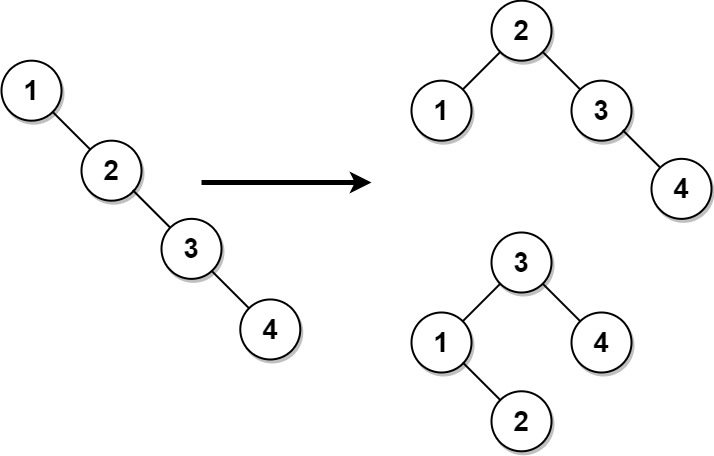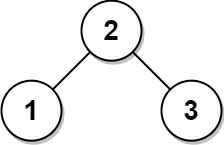Problem
Given the root of a binary search tree, return **a *balanced* binary search tree with the same node values**. If there is more than one answer, return *any of them*.
A binary search tree is balanced if the depth of the two subtrees of every node never differs by more than 1.
Example 1:

Input: root = [1,null,2,null,3,null,4,null,null]
Output: [2,1,3,null,null,null,4]
Explanation: This is not the only correct answer, [3,1,4,null,2] is also correct.
Example 2:

Input: root = [2,1,3]
Output: [2,1,3]
Constraints:
The number of nodes in the tree is in the range
[1, 10^4].1 <= Node.val <= 10^5
Solution (Java)
/**
* Definition for a binary tree node.
* public class TreeNode {
* int val;
* TreeNode left;
* TreeNode right;
* TreeNode() {}
* TreeNode(int val) { this.val = val; }
* TreeNode(int val, TreeNode left, TreeNode right) {
* this.val = val;
* this.left = left;
* this.right = right;
* }
* }
*/
class Solution {
public TreeNode balanceBST(TreeNode root) {
List<Integer> inorder = inorder(root, new ArrayList<>());
return dfs(inorder, 0, inorder.size() - 1);
}
private List<Integer> inorder(TreeNode root, List<Integer> list) {
if (root == null) {
return list;
}
inorder(root.left, list);
list.add(root.val);
return inorder(root.right, list);
}
private TreeNode dfs(List<Integer> nums, int start, int end) {
if (end < start) {
return null;
}
int mid = (start + end) / 2;
TreeNode root = new TreeNode(nums.get(mid));
root.left = dfs(nums, start, mid - 1);
root.right = dfs(nums, mid + 1, end);
return root;
}
}
Explain:
nope.
Complexity:
- Time complexity : O(n).
- Space complexity : O(n).